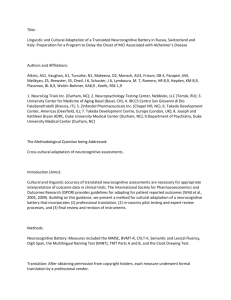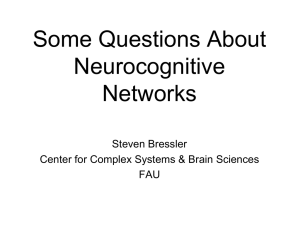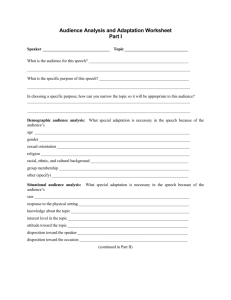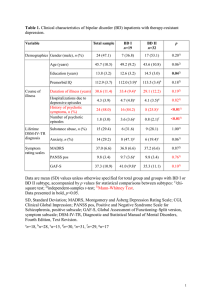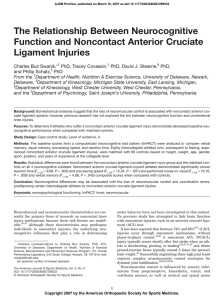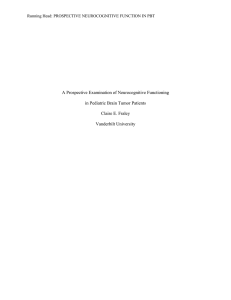Atkins_Abstract
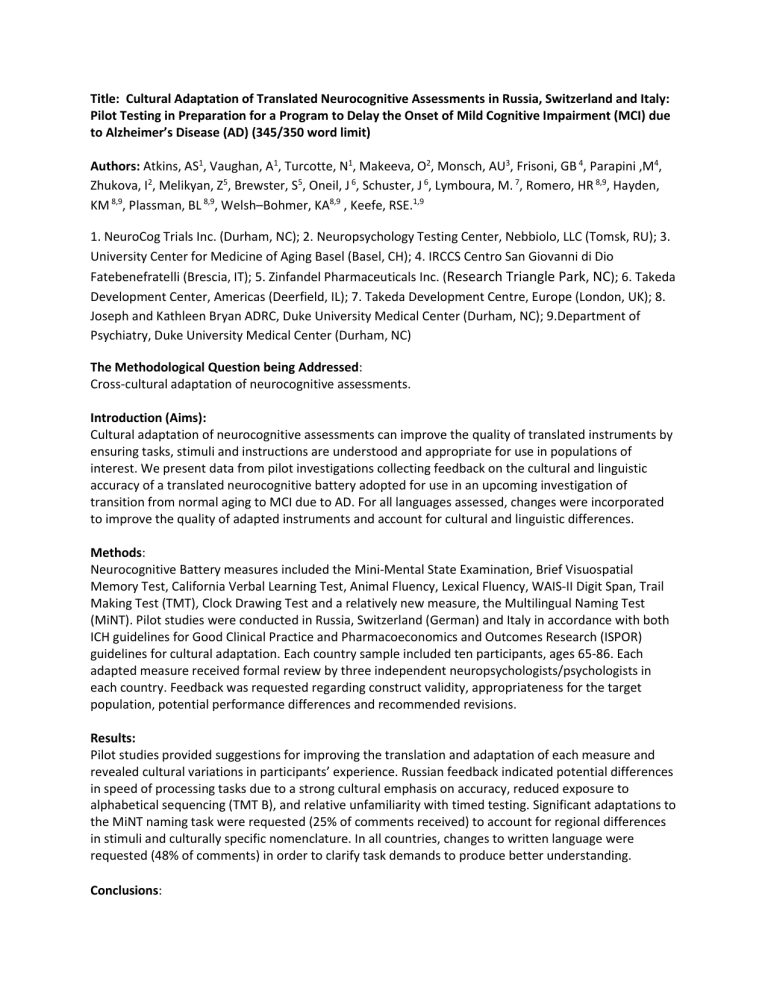
Title: Cultural Adaptation of Translated Neurocognitive Assessments in Russia, Switzerland and Italy:
Pilot Testing in Preparation for a Program to Delay the Onset of Mild Cognitive Impairment (MCI) due to Alzheimer’s Disease (AD) (345/350 word limit)
Authors: Atkins, AS 1 , Vaughan, A 1 , Turcotte, N 1 , Makeeva, O 2 , Monsch, AU 3 , Frisoni, GB 4 , Parapini ,M 4 ,
Zhukova, I 2 , Melikyan, Z 5 , Brewster, S 5 , Oneil, J 6 , Schuster, J 6 , Lymboura, M.
7 , Romero, HR 8,9 , Hayden,
KM 8,9 , Plassman, BL 8,9 , Welsh–Bohmer, KA 8,9 , Keefe, RSE.
1,9
1. NeuroCog Trials Inc. (Durham, NC); 2. Neuropsychology Testing Center, Nebbiolo, LLC (Tomsk, RU); 3.
University Center for Medicine of Aging Basel (Basel, CH); 4. IRCCS Centro San Giovanni di Dio
Fatebenefratelli (Brescia, IT); 5. Zinfandel Pharmaceuticals Inc. (
Research Triangle Park, NC
); 6. Takeda
Development Center, Americas (Deerfield, IL); 7. Takeda Development Centre, Europe (London, UK); 8.
Joseph and Kathleen Bryan ADRC, Duke University Medical Center (Durham, NC); 9.Department of
Psychiatry, Duke University Medical Center (Durham, NC)
The Methodological Question being Addressed:
Cross-cultural adaptation of neurocognitive assessments.
Introduction (Aims):
Cultural adaptation of neurocognitive assessments can improve the quality of translated instruments by ensuring tasks, stimuli and instructions are understood and appropriate for use in populations of interest. We present data from pilot investigations collecting feedback on the cultural and linguistic accuracy of a translated neurocognitive battery adopted for use in an upcoming investigation of transition from normal aging to MCI due to AD. For all languages assessed, changes were incorporated to improve the quality of adapted instruments and account for cultural and linguistic differences.
Methods:
Neurocognitive Battery measures included the Mini-Mental State Examination, Brief Visuospatial
Memory Test, California Verbal Learning Test, Animal Fluency, Lexical Fluency, WAIS-II Digit Span, Trail
Making Test (TMT), Clock Drawing Test and a relatively new measure, the Multilingual Naming Test
(MiNT). Pilot studies were conducted in Russia, Switzerland (German) and Italy in accordance with both
ICH guidelines for Good Clinical Practice and Pharmacoeconomics and Outcomes Research (ISPOR) guidelines for cultural adaptation. Each country sample included ten participants, ages 65-86. Each adapted measure received formal review by three independent neuropsychologists/psychologists in each country. Feedback was requested regarding construct validity, appropriateness for the target population, potential performance differences and recommended revisions.
Results:
Pilot studies provided suggestions for improving the translation and adaptation of each measure and revealed cultural variations in participants’ experience. Russian feedback indicated potential differences in speed of processing tasks due to a strong cultural emphasis on accuracy, reduced exposure to alphabetical sequencing (TMT B), and relative unfamiliarity with timed testing. Significant adaptations to the MiNT naming task were requested (25% of comments received) to account for regional differences in stimuli and culturally specific nomenclature. In all countries, changes to written language were requested (48% of comments) in order to clarify task demands to produce better understanding.
Conclusions:
Adapting existing neurocognitive measures for use in other cultures requires careful balance in efforts to achieve cultural appropriateness while maintaining the integrity of the original instruments. In the present study, in-country pilot exercises provided important input regarding cultural and linguistic variations to improve translated assessments and forecast potential cultural influences on performance.
Disclosures:
Funding was provided by Takeda Pharmaceutical Company Limited, Zinfandel Pharmaceuticals and
NeuroCog Trials.
